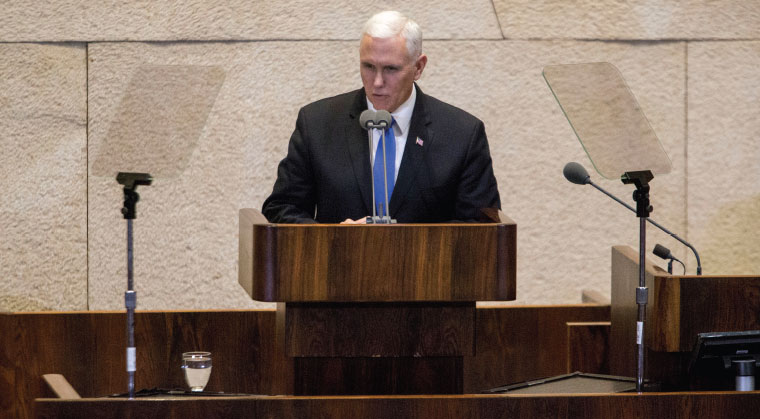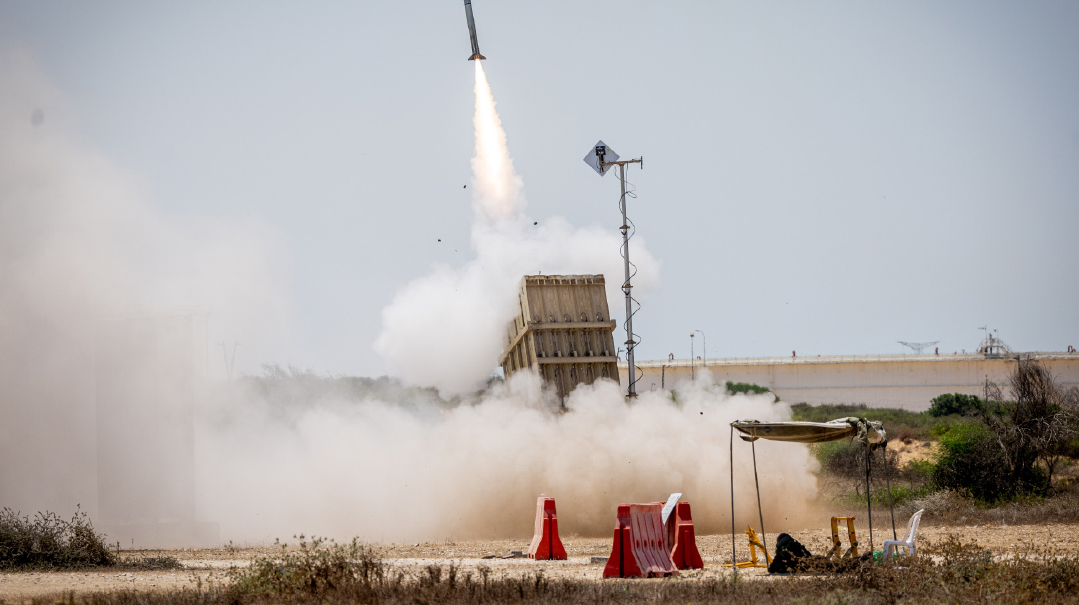Mike Pence Marvels at Israel

Pence confirms embassy move in packed Knesset address. On-site report

F
irst Person
Sometimes what counts is not what you say, but the way you say it.
In Vice President Mike Pence’s case, his Monday afternoon address to the Knesset hit the right tone on both scores.
Speaking before an almost full house — with the exception of members of the Joint List of Arab parties, ejected forcibly from the plenum after staging a demonstration with placards saying “Jerusalem is the capital of Palestine” at the start of the speech — Pence cleared up the controversy brewing for the past few days over if and when the US will move its embassy from Tel Aviv to Jerusalem.
Pence said President Trump has ordered “immediate preparations” that will continue in the weeks ahead to make that move, and it won’t be a long wait for that to become a fact on the ground.
“That [new] United States embassy will open before the end of next year,” Pence said, adding that the decision serves the cause of peace. “The US has chosen fact over fiction, and fact is the only foundation for a true and lasting peace. And President Trump is committed to achieving a lasting peace.”
Pence’s first message, on the embassy move, earned him a warm standing ovation, both in the plenum and in an audience of several hundred invited guests who included ambassadors, military officials, and friends of the administration.
His second message, on achieving a lasting peace, got some scattered light applause, as well as a few chuckles from skeptics — although it’s clear to most observers that we will see an address change at the embassy long before any peace treaty can be signed.
“In our part of the world, politics changes from day to day. Even within minutes, everything can change,” said Marc Zell, chairman of Republican Overseas Israel, who says that President Trump’s recognition of Jerusalem as Israel’s capital was a reality check for the administration. “They’ve gotten to see the true face of the Palestinian side in this equation, and it’s not a pretty sight. The administration really sees that.”
Oded Revivi, the chief foreign envoy for the Yesha Council, said he too has reason to be optimistic. “I think the major area we can be happy and satisfied with is that the administration has been consistent in not repeating the same mistakes that have been made in the past.”
While Pence broke ground by setting a time frame for the embassy move, he devoted a considerable amount of his address to restating Trump administration positions. He noted that the recognition of Jerusalem and the embassy move are not meant to define the ultimate borders of Jerusalem, or Israel, and that the US would support a two-state solution only if both sides agree to it.
Changing tones to speak sternly, Pence urged the Palestinians to return to the peace table.
As opposed to a report in the mainstream Israeli press on Sunday that Pence would use the term “painful choices” to describe what the US expects of Israel, Pence instead employed a much softer term, saying “we recognize peace will involve compromise.” And putting that immediately after his warning to the Palestinians, it can be interpreted as applying to them equally.
Hearts & Minds
Pence’s demeanor exudes restraint and dignity, but he spoke from the heart, as well. Noting that Israel would be celebrating 70 years of statehood in May, he said he was proud to stand at the Knesset podium and recite the final words of the shehecheyanu blessing with quite decent Hebrew pronunciation; even his letter ches was close to the mark. And in a line the Jewish Agency, responsible for aliyah, couldn’t have phrased better, Pence added: “Anyone who seeks a brighter future should cast an eye to this place and marvel at what they behold.”
Israeli leaders reacted in kind.
Prime Minister Binyamin Netanyahu thanked the US for its ongoing military assistance that has helped it survive in a “region dominated by zealotry and intolerance,” and for the economic aid it gave when Israel needed.
“There is no substitute for the US-Israel relationship, because it comes from the heart,” Netanyahu added.
The Jerusalem municipality and the Knesset displayed their solidarity with the Pence visit. Signs saying “Welcome, Vice President Pence, you are a true friend of Zion” were plastered up all over the city. At the entrance to the Knesset, Israeli and US flags flapped mightily in a brisk wind. Israeli police declared the highest “code blue” alert to secure the visit, and intermittently closed roads leading to the Knesset. Helicopters hovered overhead providing security from the sky, while explosives-sniffing police dogs patrolled the Knesset perimeter.
A small entourage of invited guests mingled at a reception in one of the Knesset lobbies before the speech. Trays of fresh fruit were set out, as well as two sets of cookies — one marked “sugary” and one marked “salty” for the health-conscious American crowd.
This was Pence’s sixth visit to Israel. As an evangelical Christian, he has emotional and religious draws to the Holy Land, but he has also found it’s good for business.
His last trip here was in 2014, as governor of Indiana. Spending two weeks in Israel, he returned home with agreements from four new Israeli companies to set up facilities in Indiana. One of the biggest objections Pence found he had to overcome on that trip was the fact that Indiana had once been a hotbed for the Ku Klux Klan.
“He made a point of saying those days are over, that Indiana is a welcoming place for Israeli companies and we’d like you to consider it,” said Sherwin Pomerantz, president of Atid EDI, a Jerusalem agency that represents 13 US states who have established commercial relations with Israel.
Perhaps the optimism Pence exuded over the Klan’s marginalization gives him some grounds to hope that Middle East peace is still possible.
“Some say the world can’t change, violence is endless, and age-old conflicts can’t be solved,” Pence told the Knesset. “President Trump doesn’t believe it. I don’t believe it, and neither do you. I stand here in the very city whose name means peace.”
Pence began his Middle East swing with a visit to the two countries who have signed formal peace treaties with Israel. In Egypt, he met President Abdel el-Sisi, and then in Jordan he met with King Abdullah II. Pence also made an unscheduled visit to a US military base near the Jordan-Syria border on Sunday, and was scheduled on Monday night after press time to have dinner with Prime Minister Netanyahu.
On Tuesday, he was scheduled to lay a wreath at Yad Vashem and then visit the Kosel before flying back to the US.
The visit was also notable for stops the Vice President did not make. The Palestinian Authority made it clear Pence was unwelcome. The vice president also did not visit any Christian holy sites, including neighboring Bethlehem, which is located in Area A — under full Palestinian control under the Oslo Accords.
Pence did say the US would commit $110 million in aid to assist Christian minorities across the Middle East, and he extended an olive branch to the Iranian people, 1,000 kilometers away. “We are your friends, and the day is coming when you will be free from the evil regime that suffocates your dreams and buries your hopes,” Pence said.
For the Iranian regime, who he called the world’s leading sponsor of terror, he minced no words. “The Iran nuclear deal is a disaster, and the United States of America will no longer certify this ill-conceived agreement.”
Saying radical Islamic terrorism knows no borders and understands no reality other than brute force, Pence said the US and its strategic partners, including Israel, “will continue to fight terror together” and “starve terrorists of their territory and the false, craven allure of their ideology.”
He ended his address noting that he was standing in the land G-d promised to Abraham’s descendants 4,000 years ago and that the US is proud to stand with Israel, both as an ally and a cherished friend.
“We pray for the peace of Jerusalem,” Pence concluded. “I say from my heart. May G-d bless the Jewish People. May G-d bless Israel and all who call these lands their home.”
Hitching Israel’s Horse to Trump
There is no disputing the change in tone between the Trump and Obama administrations on just about every issue, especially the Middle East.
Yet Israeli insecurity is deep-seated, and some fears were expressed during the days leading up to Pence’s visit that Israel might be getting too cozy with the Trump administration, a relationship that could backfire if Trump presents his ultimate peace deal and asks Israel to give something that it can’t, either security-wise or politically.
Others make the argument that it is foolhardy for Israel to cast its lot with Trump, whose 40% approval rating among Americans is meager. And meager as it is, 40% is high compared to how other countries view him.
In a recent Gallup Poll, Israel was one of only four countries to say they preferred President Trump to former president Obama. The other three are far from the world’s titans of democracy — Belarus, Macedonia, and Liberia.
Israel might seem to be in bad company in that regard. However, it’s worthwhile to recall a quip I heard from Idaho’s Republican congressman Raul Labrador at an October 2016 town hall meeting in Jerusalem. Labrador said that under Obama, the US enjoyed better relations with just two countries — Iran and Cuba.
If international relations were a popularity contest, this would matter more, but diplomacy is the art of defending and enhancing one’s interests in an intricate and dangerous world. Relations between nations are based on mutual interests and strategic requirements, not friendships. And while the US-Israel relationship might be the closest thing to a friendship, it’s still a relationship based on common interests.
In granting Israel unprecedented slack, the US has aligned itself with Israeli interests as never before. Pence referred to this historical context when he said President Truman merely started the job as the first world leader to recognize Israeli independence in 1948, but he had left the job incomplete.
Trump is now filling in those blanks, Pence said.
He has recognized Jerusalem as Israel’s capital — one of Netanyahu’s pet causes, while parting ways with the intransigence of the Palestinian Authority, one of Bibi’s pet peeves. The Trump administration has also vigorously defended Israel in the United Nations as no president has before, and the Trump administration has stated clearly that it does not view the Arab-Israeli conflict as the major impediment to Middle East peace.
In that regard, it would take the world by surprise if Prime Minister Netanyahu were to keep his distance from President Trump based on polls.
(Originally featured in Mishpacha, Issue 695)
Oops! We could not locate your form.






